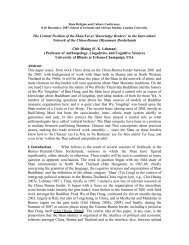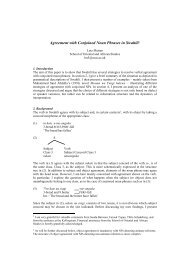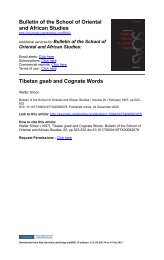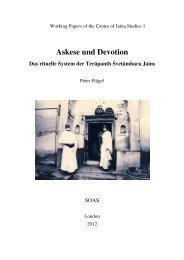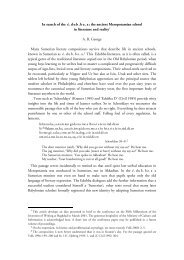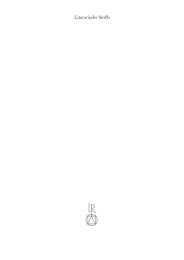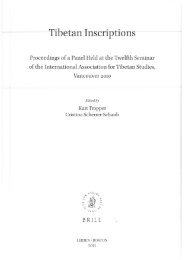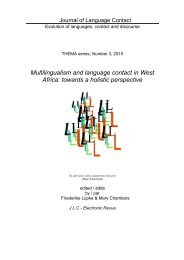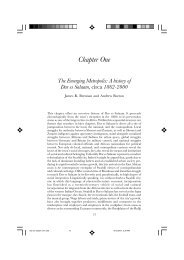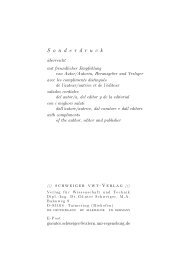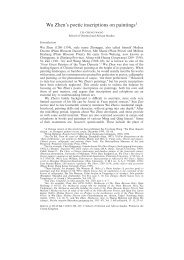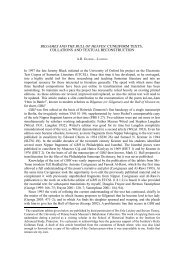Download (549Kb) - SOAS Research Online
Download (549Kb) - SOAS Research Online
Download (549Kb) - SOAS Research Online
Create successful ePaper yourself
Turn your PDF publications into a flip-book with our unique Google optimized e-Paper software.
92 Warfare and Poetry in the Middle East<br />
but with /š/ in Hurrian and Akkadian transcription. Transliterated as opposed to<br />
transcribed elements are joined with /-/. Enclitic elements are indicated by means<br />
of /=/: n=at ‘and it/they’.<br />
21 For the identification of Hurrian language fragments of this epic at Hattusa see<br />
Giorgieri 2001.<br />
22 Güterbock 1951:142–144; McNeill 1963; Durnford 1971. See further Eichner<br />
1993.<br />
23 Eichner 1980.<br />
24 Melchert 1998.<br />
25 Kloekhorst 2011.<br />
26 See further Melchert 2007; Carruba 1998. Further Haas 2006:288–302 on poetic<br />
language.<br />
27 Archi 2009.<br />
28 Watkins 1986:58–62 makes the intriguing suggestion that there was a Luwian<br />
language Wilusiad on the subject of the town Wilusa, thought by many to be<br />
identical to Homer’s Ilion. The basis for this hypothesis is one line in the Luwian<br />
‘Songs of Istanuwa’ which uses poetic syntax and alliteration (KBo 4.11 rev. 46):<br />
a!!a=ta=tta alati awita wilusati ‘when they came from high Wilusa’. This would<br />
be the first line of a larger narrative composition. For related literature see Haas<br />
2006:287.<br />
29 Gilan 2011.<br />
30 The identification of stress units mainly follows the criteria laid out in Kloekhorst<br />
2011. It is unlikely that ma!!an, the subordinating conjunction meaning<br />
‘just as’, carried stress. It does not carry the post-tonic clitic =ma, ‘but’: see<br />
GIŠ<br />
SERDUM=ma=z m"!!an Ì-ŠU ŠÀ-it [!arzi] (KUB 17.10 ii 19) ‘but just as<br />
the olive [holds] its oil inside …’; ma!!an meaning ‘when’, by contrast, does<br />
carry =ma, cf. Chicago Hittite Dictionary L-N 107. I know of no evidence which<br />
could indicate one way or the other whether its correlative adverb kissan ‘thus’<br />
carries stress, but the demonstrative pronoun ka- ‘this’, from which it is derived,<br />
certainly can do, in that it can carry =ma. The assumption that one of either k"<br />
‘this’ or its noun (e.g. BAPPIR, ‘beer-herb’) does not carry stress when they are<br />
together and thus count as one stress unit is highly suspect. Without making this<br />
assumption even the most rudimentary verse-like rhythm cannot be achieved in<br />
these lines.<br />
31 KBo 6.34+ obv. ii 19-30. Oettinger 1976:10–11, 34. Collins 2003:166.<br />
Particularly in lines 26–28 there are spelling and grammatical mistakes that may<br />
partly result from confusion in textual transmission. Line (27) translates literally<br />
as ‘may he heat him thus and he will be pounded thus’.<br />
32 Otten 1981. English translation van den Hout 2003:199–204.<br />
33 Goetze 1928; Beckman 1999:153–160.<br />
34 Beckman 1999.<br />
35 Singer 2002.<br />
36 Otten 1973; Holland and Zorman 2007; Zorman 2008.<br />
37 See the ‘ritual of Zalpa’ at KBo 12.63, 3’, which is interpreted as a historical<br />
reference to a ‘ritual in Zalpa’ at Corti 2002:173.<br />
38 Dardano 1997; Beckman 1995.<br />
39 For a brief summary of the arguments on provenance and language of authorship<br />
for this tablet see Weeden 2011a:75.<br />
40 [t]a ? -tal-lik-ka. The verb al"ku ‘to go’, here S2m Gtn ventive, is otherwise used<br />
of water flowing, see Chicago Assyrian Dictionary A/1 (1964), 299. The reading<br />
03_Warfare&Poetry_Ch3_073-098.indd 92 06/02/2013 10:15



